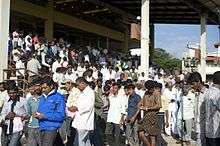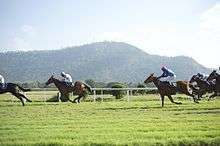Horse racing in India

Horse racing in India is over 200 years old. The first racecourse in the country was set up in Madras in 1777.[1] Today, India has a very well established racing and breeding industry, and the sport is conducted on nine racetracks by six racing authorities.
Racing is restricted to Indian-bred racehorses and India has a well established breeding industry with stallions imported from all over the world. The Indian Stud Book maintains records of all thoroughbred breeding activity in India.
India has a mixture of both pool betting and traditional bookmakers.
Turf Clubs

There are six turf clubs in India.[2] These are:
- Bangalore Turf Club, which conducts racing at Bangalore in two distinct seasons - in summer from May to August and in winter from November to April.
- Hyderabad Turf Club, which conducts racing in Hyderabad where racing is held on the Monsoon Track from July until the end of October and on the Winter Track from November until February. Hyderabad usually races on Sundays and Mondays.
- Royal Calcutta Turf Club, which conducts racing in Kolkata, with a main winter season from November to April and a monsoon season which runs from July until mid October.
- Royal Western India Turf Club (RWITC), which conducts racing in Mumbai from November to May and Pune from July to November.
- The Mysore Race Club is the most picturesque in the country. Set up in the foothills of the imposing Chamundi Hills, the Mysore Race Club has a distinct identity of its own. Mysore, which is an independent Turf Authority conducts regular season between mid-August and the end of October, as well as smaller summer and winter seasons.
Racing started in Mysore under the patronage of the rulers (Royal Family of Mysore) of Mysore as far back as 1891. The existing race course was built at around 1920 by H H Sri Nalvadi Krishnaraja Wadiyar, The then ruler of Mysore, who was a great sportsperson and also lover of race horses
- Delhi Turf Club, established in 1940, which conducts racing at India's capital usually once a week from August until May, where racing is run under the aegis of RWITC.
Chennai races a winter season at their main facility at Guindy and a spring/summer season at the hill station of Ooty.
Most of the time, except for the summer when Bangalore races on the weekends and Mysore on Wednesdays, there is a seven-day race schedule all over the country and simulcasting takes place between all the clubs.
Major races
India has five 'Classic' races which parallel the original British classic races. The Indian 1,000 and 2,000 Guineas are run in December. The Indian Oaks is run at the end of January. The Indian Derby is run on the first Sunday of February and carries a purse of over ₹ 30,000,000. Lastly, the Indian St. Leger is run in September.[3] They are all run in Mumbai, apart from the St. Leger which is run at Pune.
The Invitation Weekend which rotates between the various turf authorities is held on the first weekend of March. This features a Group 1 race each for sprinters over 1200 metres, a race over a mile and a 3000 metre race for stayers. The best horses are invited from all over the country for these races. The showpiece event is open to Indian horses which are 4 years old and over, invited from all the turf authorities, and carries a winners prize of ₹ 10,000,000. The Bangalore Derby is held on the second Sunday of July in Bangalore every year. It is sponsored by Kingfisher. Invitation cup and associated races sprinter,stayer,Super mile is rotational, Hyderbad 2014,Calcutta 2013 Banglolore 2012, Bombay 2011 and this year is RWITC' Mumbai,s Turn, is run over 2400 meters was for only 4 years old only were eligiblie but from 2014 onwards it has been changed to elder horses also.
Famous horses
Indian horses have made their mark on the international scene. Mystical won two races at the Dubai Racing Carnival. Saddle Up was the best horse in training on the Malayasia/Singapore circuit and won the Tunku Gold Cup as well as running second in the Singapore International Cup. Others to perform well have been Southern Regent, who won twice in England when way past his prime at the age of 9. Beat It Dude was one of the highest rated horses in South Korea in 2008. Astonish was a Class 1 winner in Hong Kong. Quarantine restrictions and apathy on the part of the Indian Government have kept these opportunities to race abroad very minimal. Own opinion who represented India in the Japan cup in 1980 as 7 old and although he finished 13th he beat his own record Inspite of the race track being anti-clockwise And also the quarantine period.
Famous trainers
Famous trainers include Rashid Byramji, S.S.Attolahi, Z.Dharashaw, J S Dhariwal, Pesi Shroff, S.Narredu, M.Narredu, S.S.Shah, S Padmanabhan, S.A Shehzad Abbas, Dallas Todywalla, S Ganapathy, Irfan Ghatala, Arjun Mangalorkar, Magan Singh, Vijay Singh and LVR Deshmukh. A B. DAVID THE FIRST TRAINER TO SADDLE 100 classic winners.
Famous jockeys
Famous Indian jockeys include Bajrang Singh Jodha, B Sreekanth, Vasant Shinde, K P G Appu, Suraj Narredu, P S Chouhan, A.Imran Khan, Imran Chisty, A Sandesh, S Zervan, S John, Trevor Patel, Y S Srinath, Aslam Kadar. During the winter season, many foreign jockeys also come to India. In recent years this has included the likes of Richard Hughes, Stéphane Pasquier, Martin Dwyer, Colm O'Donoghue, Joseph O'Brien, Chris Hayes, Louis Beuzelin, LadjadjStephane. In the past Lester Piggott, Johnny Murtagh, Joe Mercer, Mick Kinane, Walter Swinburn and numerous others have ridden in India.
References
- ↑ Balasubramanian, Shyam (10 June 2013). "235 years on, city horsing around in betting circles". Chennai. The New Indian Express. Retrieved Apr 28, 2014.
- ↑ "Turf Clubs". indiarace.com. Retrieved 27 April 2014.
- ↑ "Indian Classics". racingpulse.in. Retrieved 27 April 2014.
External links
- India Race India's first & formest horse racing portal
- Equine India